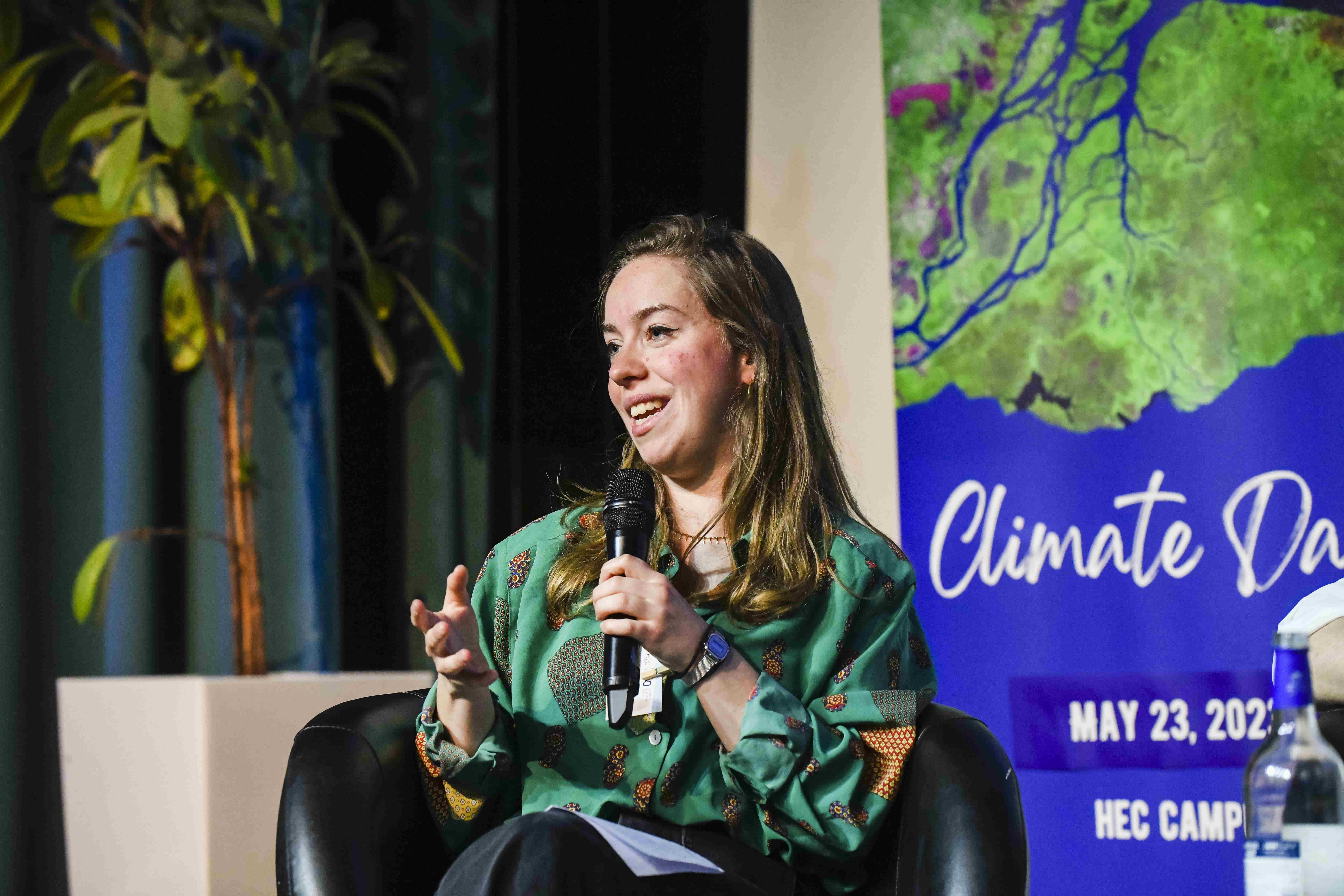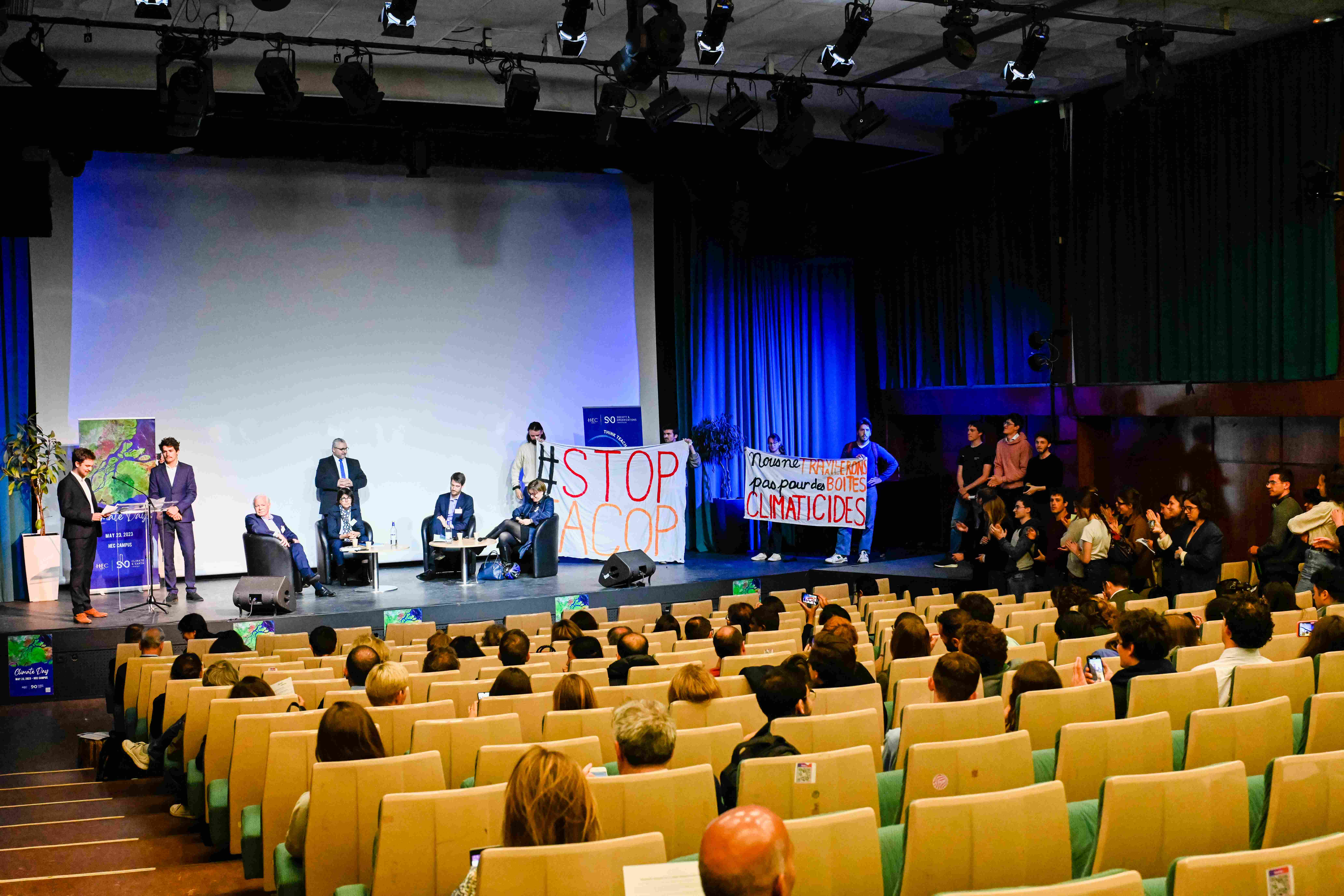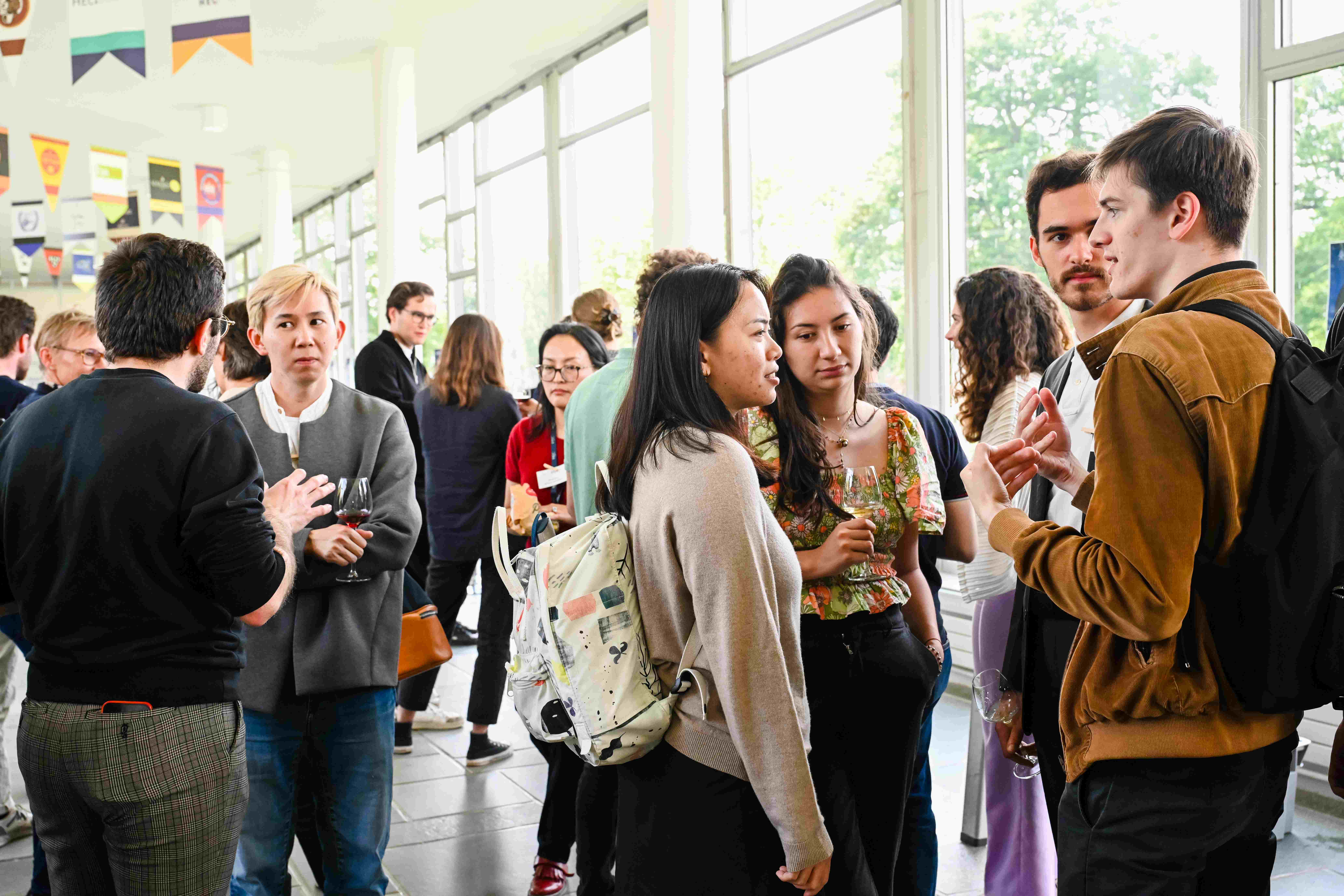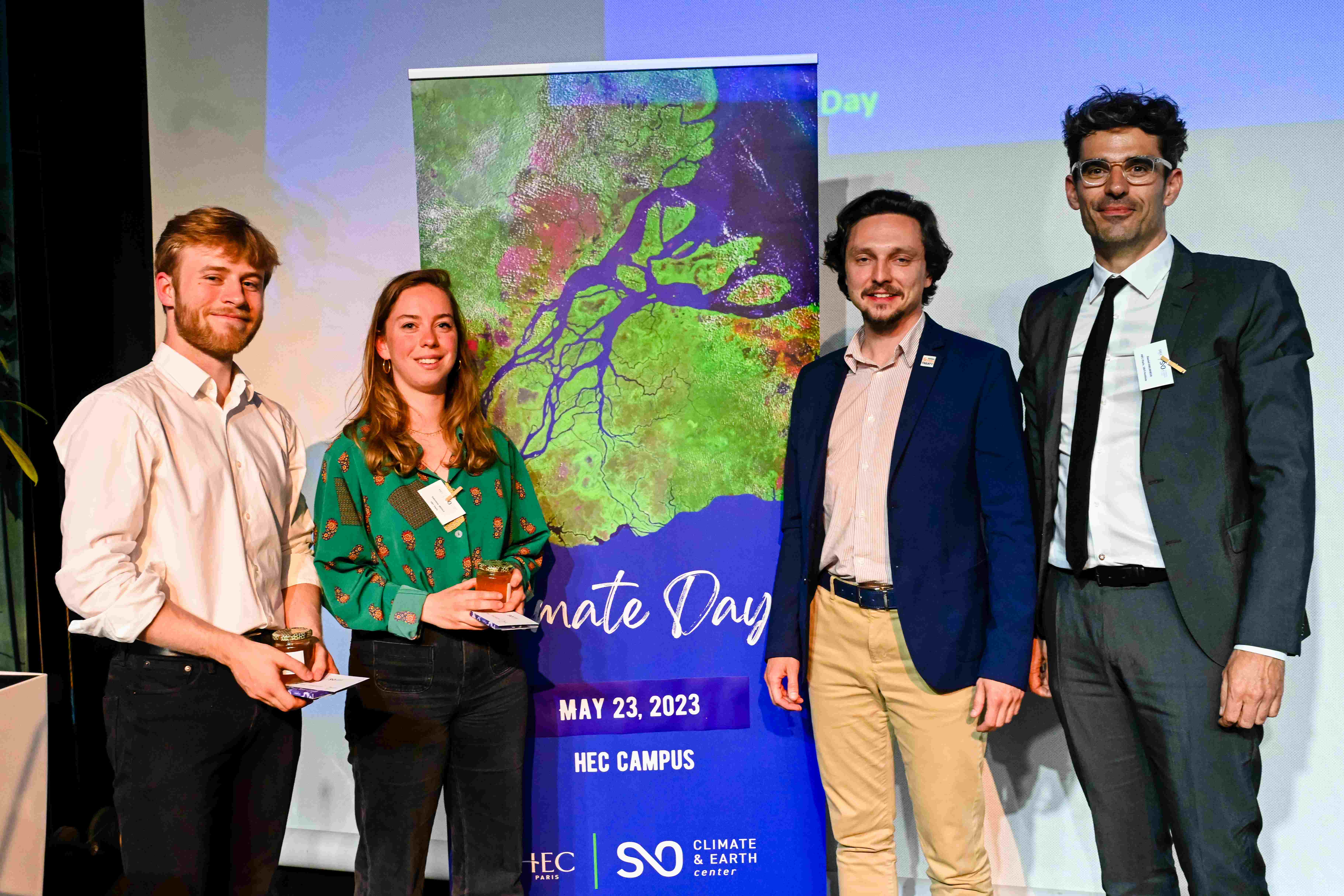HEC Climate Day 2023: Answering Tough Questions on Phasing Out Fossil Fuels
Phasing out fossil fuels, challenging public policy, debating the implications for vulnerable populations of the transition to renewables – and highlighting some success stories. These were just some of the panel sessions at the heart of the second edition of HEC Climate Day, organized by the S&O’s Climate & Earth Center. A day which saw impassioned exchanges, controversy, and clear insights into possible solutions to a deeply complex issue.
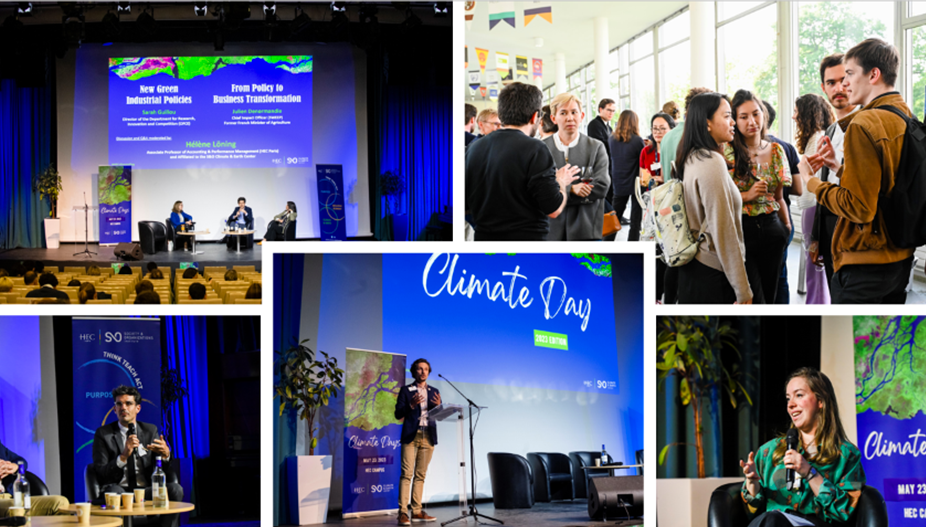
© Marcella Barbieri
“At first glance, climate is not a happy topic, with dreadful figures, and threats that have no silver bullet. As we’ve seen, it provokes furious debates. So, what to make of it all?” With poise, final year student, Valentine Japiot, summed up the feelings of many attending the May 23 Climate Day, held again on the Jouy campus. “It’s been enthralling but worrying,” the cofounder of HEC Transition pursued in the closing panel. “Well, that rhymes a concept I’d like to share, called cognitive dissonance. You know, when you want to reduce your carbon footprint by cutting back on flights, but you have wanderlust, for that life-changing backpack voyage to Latin America. Or there’s that desire to be in one of the world’s best schools but you’re aware of the risk of becoming one of the majority of students who end up being business-as-usual soldiers.”
Student Valentine Japiot © Marcella Barbieri
Japiot was part of a panel discussing the “Young generation’s vision for the transition”. Co-organizer of the daylong event, Igor Shishlov, nodded in agreement as she admonished the audience to fight resignation: “Be a saboteur and a builder!” she concluded emphatically. Shishlov and fellow-academic Daniel Halbheer had opened proceedings with similar rallying words to bring together students, practitioners and professors. “We need strong leadership from business, stakeholder actions and sound policy,” said Halbheer to start the ball rolling. “We need collaboration between all these players to progress towards net zero targets. Today, we will be debating the best ways towards energy transition and there will be some success stories to inspire all of you.”
Halbheer and Shishlov have been been working on just such topics for the past two years. Together, they have engineered a course to forge students into climate leaders, which bagged the prestigious Bruno Roux de Bézieux award 2022. “We have the immense task of reimagining and transforming the way we produce energy,” said Shishlov at the outset of the day. “We also must question how, and how much, we consume. These are not simple questions, and we must embrace and understand their complexity.”
Protest by students © Marcella Barbieri
Clash of Approaches
Such complexity came to the fore in the second debate, on transitioning from fossil fuels to renewables. On the panel chaired by the Energy & Finance Professor Jean-Michel Gauthier, were practitioners from energy and alternative energy sectors as well as a lead writer for the IPCC report 2022. It was the moment when the event was interrupted by 31 HEC students who staged what they called a “joyful ceremony” inspired in its form by the Cannes Film Festival. This protest theater act denounced the presence at HEC of representatives of what the students called “climaticide companies”. “To all the politicians who once studied at HEC, whether they are ministers or MPs, it is time to dare again. We no longer have time for naïve appeals, pious wishes, nor for media attention,” they stated. The demonstrators then left the amphitheater, refusing the dialogue proposed by the moderator. But some of their arguments were picked up by senior researcher at Sciences Po, Yamina Saheb. “I applaud this action,” she said. “With ongoing policies, we will reach +3°C warming by the end of the century. That means the end of all life on this planet. Yet, companies like Total, present here, devote 70% of their budget to fossil fuels! We need to stop lying to ourselves: there can no longer be a transition, we must end the fossil fuel era right now.”
Whilst concurring on the need to stop fossil fuels immediately, Carole Le Gall begged to disagree. She’s the Sustainability & Climate Senior VP at TotalEnergies and, as such, was invited to share with the panel her analysis. “The question we are posing is how to decarbonize energy as fast as possible? It’s not something that happens magically, you can’t just stop using fossil fuels, or it will create major social and economic havoc. It takes time, it takes money to put in place real alternatives. Of course, we’ve been collectively too slow, but there is a shared responsibility in this matter: private companies need a business case to invest and it is just now that renewable energies like solar or wind power have become profitable. At TotalEnergies, we set a target of reducing oil sales by 40% between 2015 and 2030 and this marks a major transformation of our company. Together with the consumers and energy producers, we are going to make it. But we have to accept that green energy takes time to build and comes at a greater cost.”
Claire Martin, the VP Sustainability at CMA-CGM, added that, whilst she understood the students, the energy industry has to remain optimistic and solution-driven. “We must offer concrete solutions in a sector where there is not much technology available on the table. An example is the use of biogas in the future. The challenges are not easy, but we are transforming the industry from the inside, with the help of other actors and partners.” The fourth panelist, Markus Fischer underlined the price of inaction: “The cost of energy transformation is huge, yes,” said the Regulatory Adviser at Ørsted, a green energy company developing wind farms. “But the cost of doing nothing is greater. Just look at Italy: they were subjected to six months of rain in the space of 36 hours, bringing up global warming by 1.1°! So, we have to make the necessary investments and design clearer business plans – otherwise, the social and societal consequences will be catastrophic.” And, in his summary, Fischer noted that the targets are insufficient: “And, yet, we are not even reaching them! We are currently off-track, partly because we also have to fight the biodiversity crisis at the same time.”
Lively discussions spilled over into the entrance of Amphitheater Bellon © Marcella Barbieri
Space for Debate
After what Jean-Michel Gauthier summed up as “a lively debate”, panelists in the other sessions returned to the students’ intervention in the morning. “We need to be challenged,” admitted Armelle Perrier of STEF. “The transport sector I work in might not be very sexy, but we want to contribute to changing the world. So, we need young people to ask us: ‘Hey, what are you doing?’ They must come and work with us, to help change things from within. It helps change the minds of the older generations. It really is a question of generations. By asking the real questions, you sow seeds and water them. It helps change management approach.”
For HEC, the impromptu opinions expressed by the students were respected: “Their approach is in line with our vocation of being a space for debate,” said François Collin, HEC Director for Climate and Environmental Sustainability. “Energy transition is at the heart of climate concerns, and it is impossible to avoid the question of transformation strategies undertaken by the oil and gas companies. By inviting them,” Colin continued, “the school is neither complacent or greenwashing, nor is it implicitly supporting their strategies. The debate on stage was extremely lively and truly contradictory. We believe that listening and hosting critical debates are. fundamental. It avoids simplifications and hasty conclusions on complex subjects.”
Learning to Do the Splits and Manage Constraints
This second edition of HEC Climate Day also provided an opportunity to share some success stories of net-zero transformation beyond the energy sector. Companies like Nexans, STEF, and Accenta showcased their efforts and underscored the importance of acting with a sense of purpose to create positive impact. Such commitment and engagement from employees, they said, can be an invaluable lever for driving change.
The final remarks by fourth year student Valentina Japiot insisted on the evolutions within the business school: “Cognitive dissonance also means that a desire for deep change now has to coexist with the acknowledgement that time is needed to reallocate research and jobs in the energy industry,” she said. “HEC teaches us to do these splits and manage these constraints. I will be leaving HEC this year with the conviction that things are moving here. Four years ago, the school only offered a sprinkling of climate MOOCs (with some notable exceptions, whereby the school offered modules on Climate & Energy, ed.). Today, we have mandatory courses from the beginning of our degree program; we meet renowned experts on alternative energy; the SASI Sustainability & Social Innovation Master’s degree has doubled in size; environmental student associations are flourishing; and core courses are slowly shifting.” And she concluded: “There is still a long way to go. But this drive makes you get up in the morning when you have a 40+ year career ahead. This purpose gives us strength.”
Co-organizers Igor Shishlov and Daniel Halbheer (right) with student representatives Valentine Japiot and Max Permaton © Marcella Barbieri
